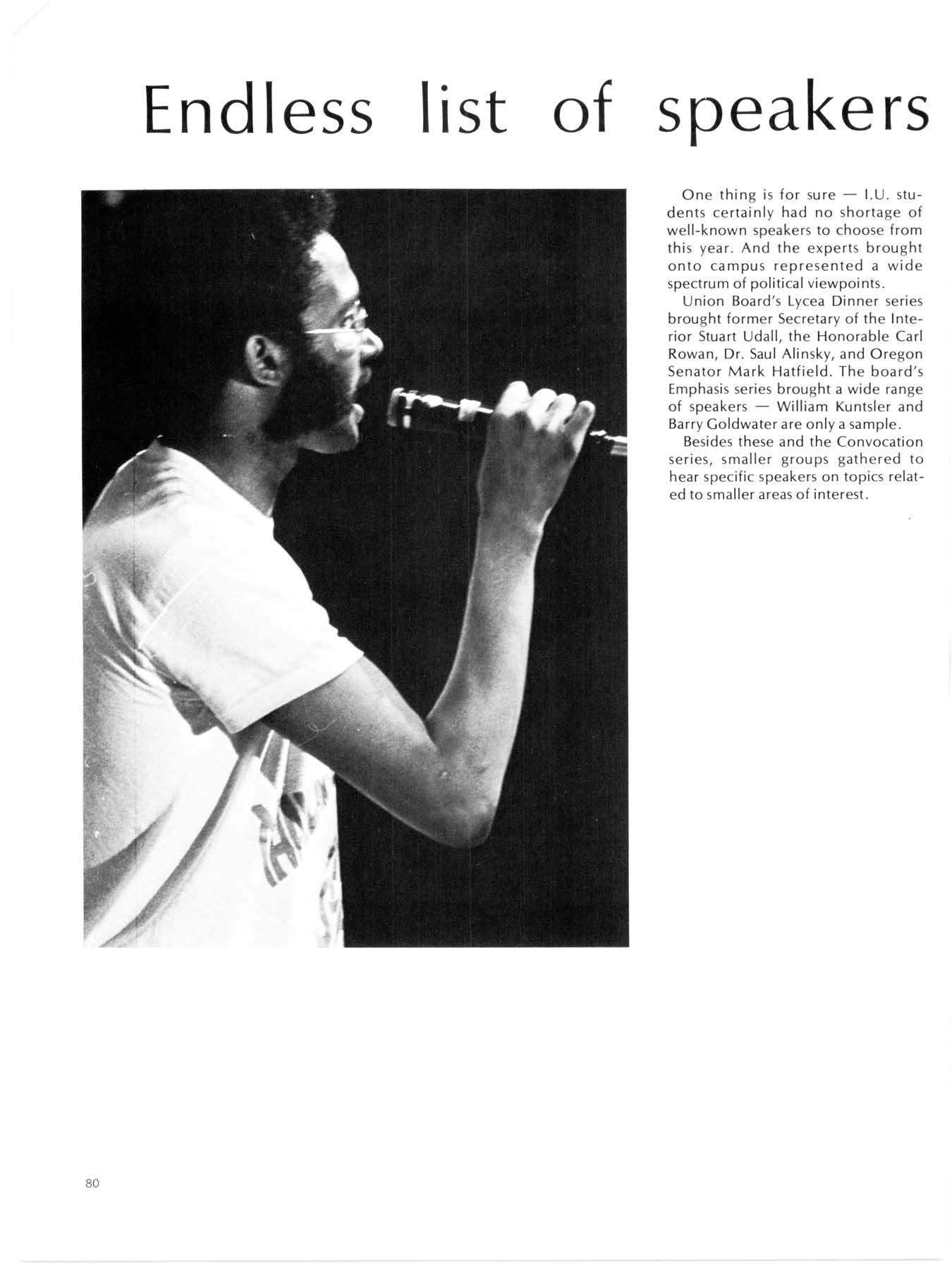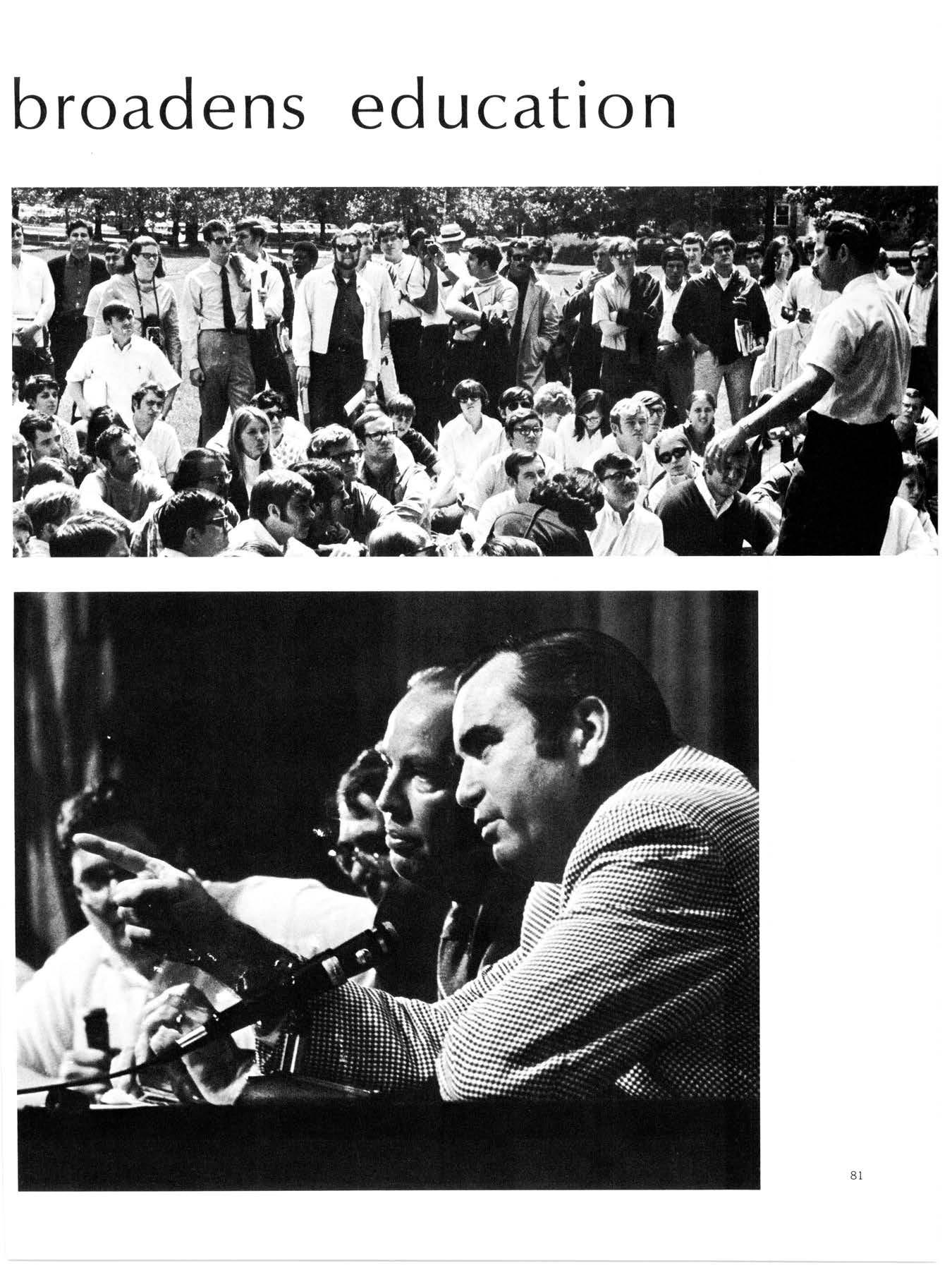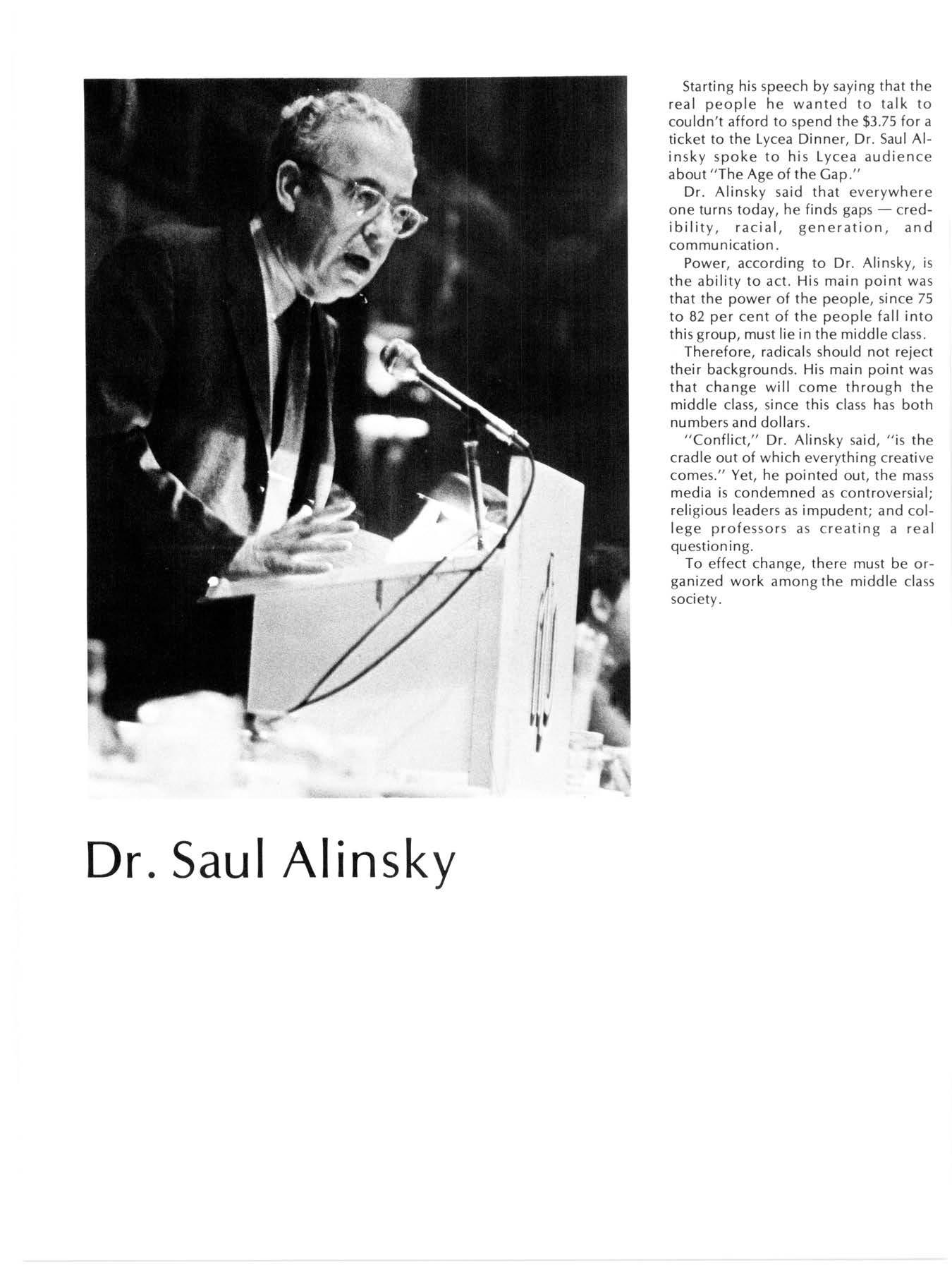
7 minute read
PRESIDENT RYAN
A new face in Bryan Hall
Dr. John W. Ryan, vice-president and chancellor for regional campuses was elected 14th president of I.U. on Jan 26, 1971.
Advertisement
Dr. Ryan succeeded Dr. Joseph L. Sutton who tendered his resignation because of the death of Mrs. Sutton after a long illness and his resultant concern for his four children. "I assume the position of president of I.U. with a mixed set of emotions.
I am conscious that many challenges lie ahead.
I have confidence — in the eminence of Indiana
University as an outstanding institution of higher education. An eminence which is developed from its human resources — its students, its faculty, its adminstration, its alumni and its many friends and supporters.
We must maintain and enhance the excellence for which our university is already noted."

Endless list of speakers
One thing is for sure — I.U. students certainly had no shortage of well-known speakers to choose from this year. And the experts brought onto campus represented a wide spectrum of political viewpoints.
Union Board's Lycea Dinner series brought former Secretary of the Interior Stuart Udall, the Honorable Carl Rowan, Dr. Saul Alinsky, and Oregon Senator Mark Hatfield. The board's Emphasis series brought a wide range of speakers — William Kuntsler and Barry Goldwater are only a sample.
Besides these and the Convocation series, smaller groups gathered to hear specific speakers on topics related to smaller areas of interest.

broadens education


Black and angry. That sums up Dick Gregory's verbage on "Civil Rights" along with humorous slams on President Nixon and Vice-President Agnew.
A comedian, writer and civil rights advocate, Gregory dwelled mostly on the subject of the racial situation in America. He explained that blacks are not asking whites not to be racists, but that they are going to react to white racism and oppression.
And most of all, Gregory said, the whites should not underestimate the blacks causes and movements, "because the same universal intelligence bank which put white heads together put black folks" heads together too."
Another ill of the American society according to Gregory is the inconsistant value system. "American thinking can use temporary insanity as a defense for murder but not for forging a check."
M. S. Arnoni

M. S. Arnoni came to I.U. to speak at the Third World Liberation Conference in December 1970. The Sunday morning after the conference he discussed his feelings toward the New Left — a revolutionary movement of which he is the grandfather and which he does not understand — and his life as a socialist and political journalist.
As he sees them, followers of the New Left are driven crazy by a sense of frustration at the way things are, but their methods for changing those things are inappropriate. Of the Weatherman group especially he commented, "Hooliganism is not revolution."
Revolution, to Mr. Arnoni, must consider "human sickness, human stomachs, human brains." It must be constructive and not just quick. "A glass of milk for a starving child" encompasses more socialism than 500 pages of a learned paper.
M. S. Arnoni's basic, most relevant philosophy is simple — "I oppose all things that should be opposed." Educated in Poland, Germany, and the United States, Mr. Arnoni was interned by the Nazis in an Auschwitz concentration camp, survived, and played an active role in the Resistance movement. His resistance against all things which should be resisted has continued since.
He founded a now defunct magazine, "Minority of One," whose contributors included Ho Chi Minh, Bertrand Russell, and leaders of the National Liberation Movement of Viet Nam. Currently he is in the process of starting another magazine, "People and Nations," as an "International Publication in Pursuit of Relevant Progressivism."
David Susskind
America "torn by war" took a verbal beating from David Susskind, television and movie director-moderator-producer, when he addressed an appreciative Indiana University student crowd.
Susskind, who has moderated a highly controversial television "talk-show" for 13 years, had a chance to speak his own mind as he directed audienceappealing anecdotes about the problems of America. He first blasted the Vietnam war calling it obviously immoral, unconciousable, and unwinnable. He charged that the war had distorted the society's priorities of reality so that it can't face other "agonizing" issues of the day, such as social problems.
Susskind elaborated on these problems as he spoke about the "revolutionary fervor" of blacks in America. He said he feels that the war hides actualities and that the black man's efforts are actually directed toward winning a fair place in the American society.
Although he feels that by the 1972 presidential election Americans will have seen the end of the Southeast Asian War, Susskind battered American politics as hopeless. He sees issuedodging candidates in recent elections engaged in rehtoric and character assassination.
But saving America isn't futile. Susskind feels problems can be solved through "an absolute restructuring r' the country's priorities and morality.

William Kuntsler
After a quick push for support of Bobby Seale's defense fund, William Kuntsler moved into some observations about the wrongs in American society and the reasons behind them as they pertain to students.
He quickly pinpointed several examples of governmental repression of students ranging from a presidential letter to university administrators urging restoration of order and discipline on the nation's campuses to a request for 23 million dollars to expand the FBI force by 1000 men immediately after the Army Math Research Center bombing at the University of Wisconsin.
Kuntsler pointed out that the student has become an absolute danger to our society to be disposed of as soon as the Black Panthers are gone. "You are a danger because you are seeking a new culture, you are seeking a new consciousness, you are seeking a new country."
The next time someone condemns student violence on campus while backing the Vietnam war, just ask them "if it's students who pilot the B-53's or ask them if students started the war, — or ask them if students shot down the Kennedy brothers, Martin Luther King, — or if students were in Charlie Company when they went into Song My, — or ask them if students killed themselves at Kent State on the Commons or in Alexander Hall at Jackson State." In the same breath, ask yourself in the days that lie ahead "where you're at and what it all means to you."

Dr. Saul Alinsky

Starting his speech by saying that the real people he wanted to talk to couldn't afford to spend the $3.75 for a ticket to the Lycea Dinner, Dr. Saul Alinsky spoke to his Lycea audience about "The Age of the Gap."
Dr. Alinsky said that everywhere one turns today, he finds gaps — credibility, racial, generation, and communication.
Power, according to Dr. Alinsky, is the ability to act. His main point was that the power of the people, since 75 to 82 per cent of the people fall into this group, must lie in the middle class.
Therefore, radicals should not reject their backgrounds. His main point was that change will come through the middle class, since this class has both numbers and dollars. "Conflict," Dr. Alinsky said, "is the cradle out of which everything creative comes." Yet, he pointed out, the mass media is condemned as controversial; religious leaders as impudent; and college professors as creating a real questioning.
To effect change, there must be organized work among the middle class society.
Stewart Udall
Leveling off population through birth control and non-discriminating abortion laws, eliminating waste, and demanding less of the environment's resources will be the responsibilities of the younger generation if it is to prevent an environmental disaster.
Stewart Udall, formerly Secretary of the Interior, challenged the college audience at the first Lycea Dinner to accept these measures for combating the ecological crisis. Udall added, "The idea of limits must dominate our thinking. Maybe if we demand less we will get more (from our environment)."
He hoped everyone realized the environmental movement was not a fad, nor could possibly be, for if it were, it might be the last fad ever. Udall expressed disappointment with Indiana because there was no singular active movement only a loose coalition of organizations of conservationists, consumers, family planning groups, and the youth.
Udall said that the environmental movement is a belief that profound changes are needed. Although we have excelled in building dams, bridges, and highways, we have failed to build the beautiful, balanced cities necessary for a civilization to exist.


